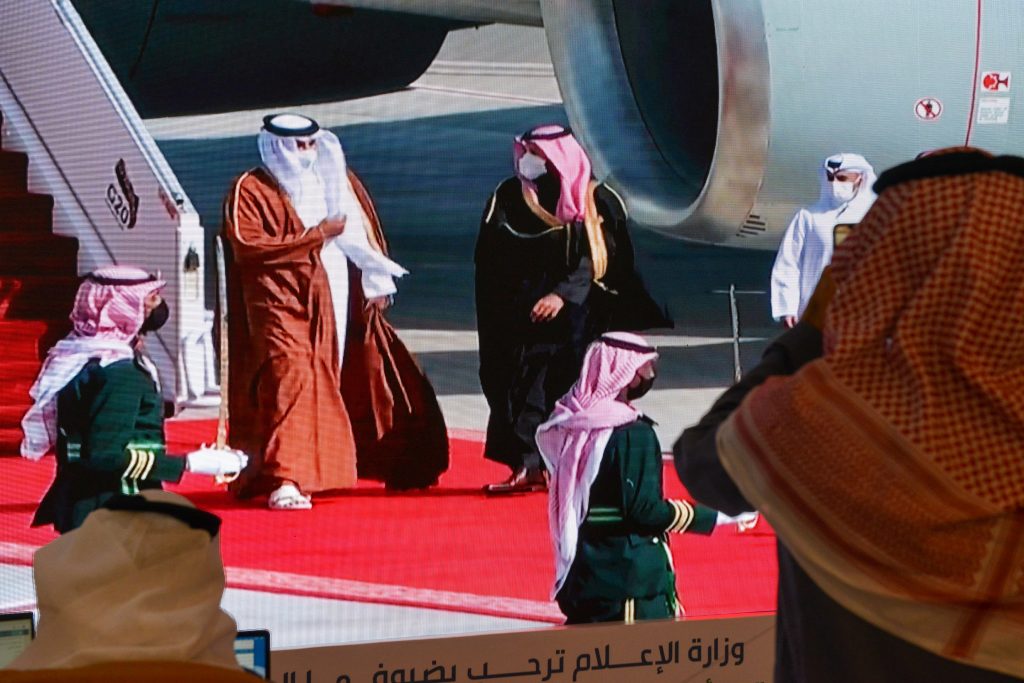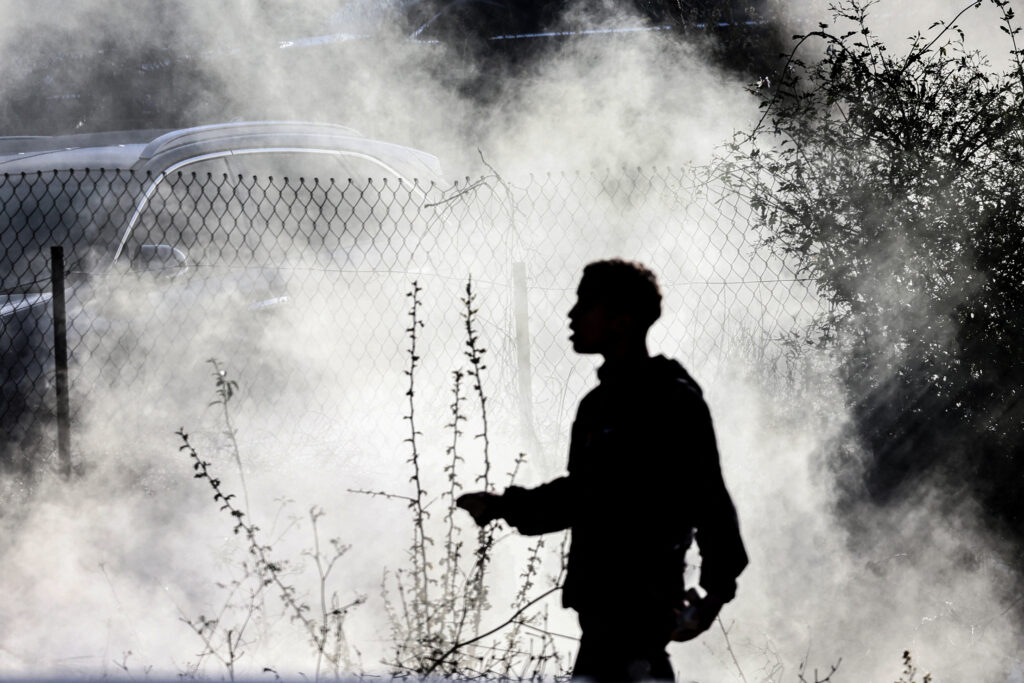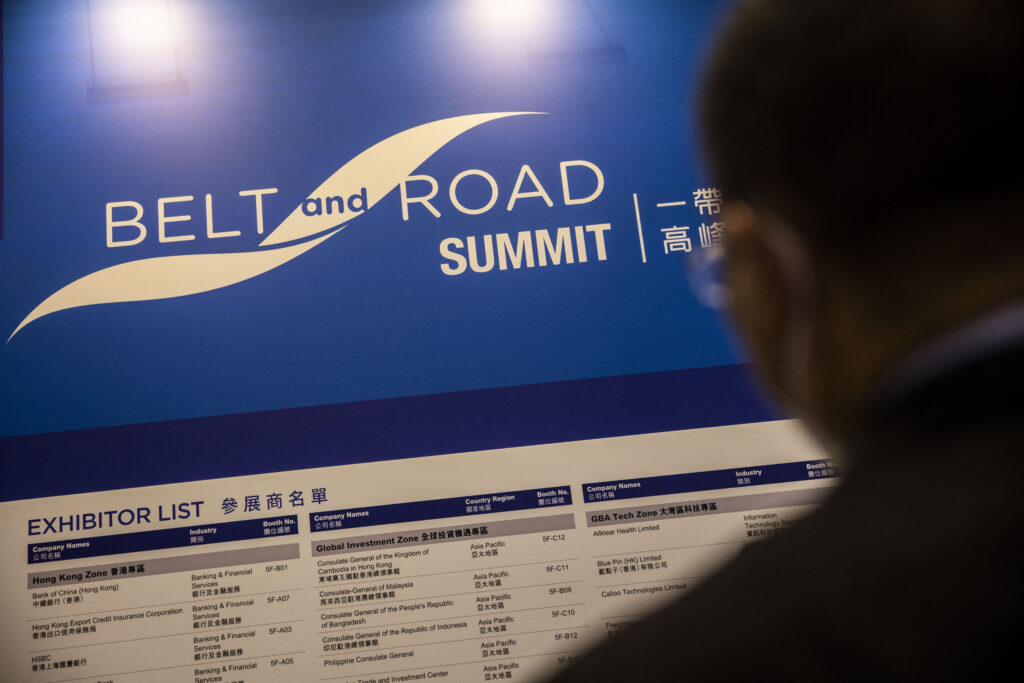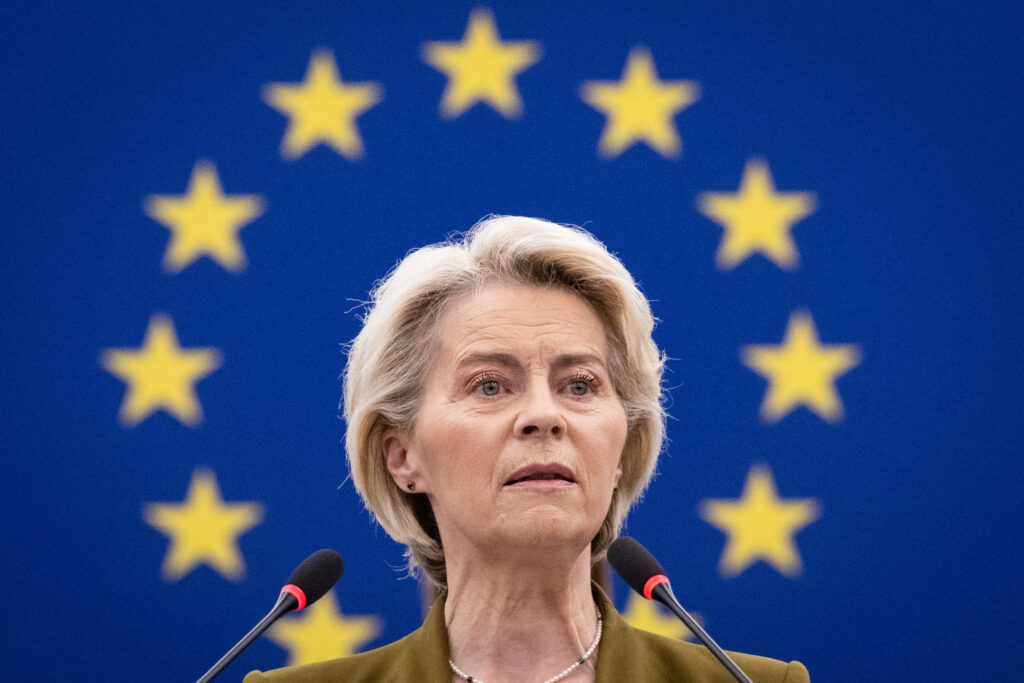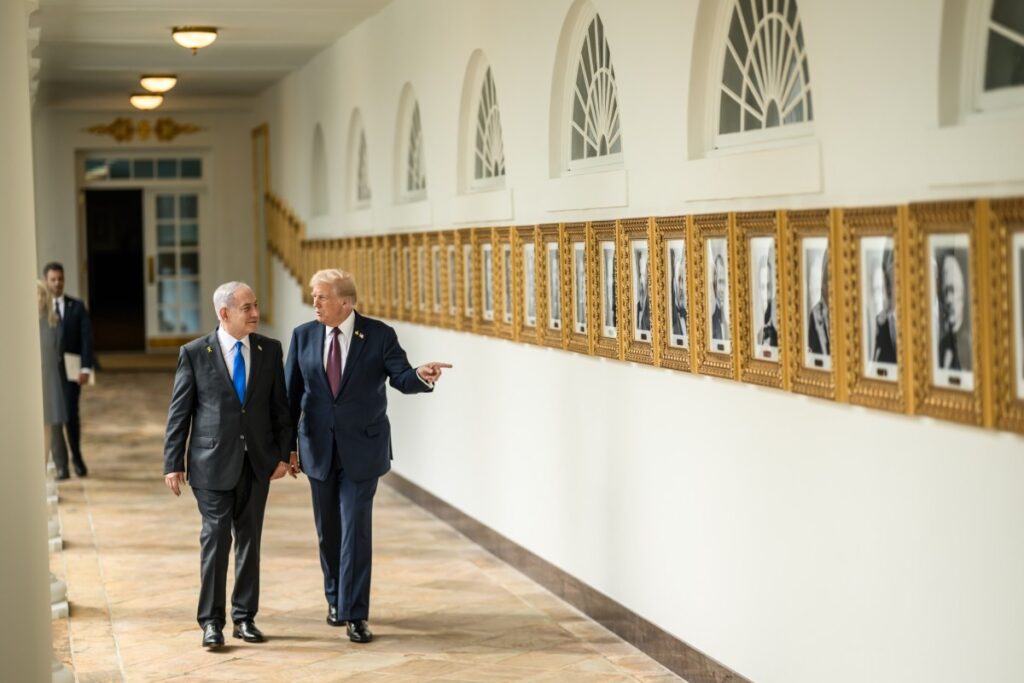Series Introduction
Doha’s Diversification Drive Post-Blockade
Since the public embrace between Saudi Crown Prince Mohammad bin Salman and Qatari Emir Sheikh Tamim bin Hamad at the Al-Ula Summit of January 2021 — which effectively ended the Arab blockade of Qatar — a key question that has come to mind is how fences will be mended between these Arab states beyond mere cosmetics. A related question revolves around the relevance and future of the Gulf Cooperation Council.
To circumvent the pressures of the blockade, Qatar hastened its strategic diversification efforts, from seeking new sources of food supply to increase its food security to deepening its bilateral ties with Turkey and Iran. Doha also has stepped up its efforts to carve out a bigger role in the rules-based international order. It has offered to mediate between different sets of parties: Tehran and Washington on the one hand and Washington and the Taliban on the other.
This series of Insights aims to uncover the various pathways to diversification that Qatar has undertaken since the blockade and following its rehabilitation by the blockading parties.
CLICK HERE FOR THE PDF
By Nima Khorrami*
Shattering the expectations of Riyadh and Abu Dhabi, Doha has not only managed to ride out the blockade of 2017 but also used the opportunity to double down on its efforts to diversify its diplomatic and commercial relations. This strategic diversification policy has allowed the tiny emirate to engage in smart balancing and emerge as a critical node in the evolving regional security network — one whose cooperation will be in high demand both by regional and extra-regional actors.
When Saudi Arabia and the United Arab Emirates (UAE) orchestrated a blockade on Qatar on 5 June 2017, the two hoped the cut-off would result in the ouster of the country’s young emir. Mohammad bin Salman of Saudi Arabia and his Emirati counterpart, Mohammad bin Zayed, had been annoyed by Doha’s insistence on charting its own path in the conduct of its foreign relations. In imposing the blockade at the peak of their “bromance”, the Saudi and Emirati pair were aware of the internal rivalries within Qatar’s Al Thani ruling tribe and confident of American support. They expected the ouster of the Qatari emir to usher in a radical reorientation of Qatari foreign policy.
As it turned out, however, the two could not have been more wrong. Not only did the Qatari emir not lose his hold on power but, in fact, he seems to have managed to deepen his authority and popularity without yielding to a single demand of the blockading parties. Notwithstanding the initial economic disruption resulting from the blockade, Qatar managed to weather the storm successfully and in fact used the assault to further diversify its diplomatic and commercial relations, increase societal resilience, and, perhaps most importantly, strengthen the sense of nationalism and patriotism among Qatari citizens. More significantly, what was supposed to have been a painful experience aimed at chastening Doha instead enabled the tiny Gulf state to substantially enhance its maritime capacity: Doha took an important first step to challenge the primacy of Dubai’s Jebel Ali port by establishing direct shipping lines between the Qatari port of Hamad and ports in Oman and India.[1]
This article seeks to shed light on the underlying factors behind the Emirati and Saudi decisions to impose the blockade in the first place, Doha’s efforts to offset the negative consequences of its neighbours’ ill-informed adventure, and the prospects for Doha in the broader context of its bilateral and multilateral relations with its neighbours and outside powers. The objective is to highlight how strategic diversification, or smart balancing, has come to constitute the cornerstone of strategic thinking and foreign policymaking in the state of Qatar.
Run-up to the Blockade
Sandwiched between two larger rival nations — Iran and Saudi Arabia — foreign policymaking in Qatar has always had two broad objectives: (i) to deter the possibility of an assault on its sovereignty by its mightier neighbours, and (ii) to avoid being pressured into taking sides in regional disputes.[2] And it is this relentless pursuit of independence that has caused great unease, and at times anger, in Riyadh.
Fearful of Saudi Arabia’s hegemonic tendencies in the Gulf and acutely conscious of Riyadh’s previous attempts at dominating political life in Doha,[3] Qatari officials see diversified strategic channels as a means of deterrence. Hence, the country has used its enormous wealth to set up a media empire bent on dominating regional news waves while simultaneously ensuring that multiple international players have stakes in Qatar’s uninterrupted sociopolitical stability. This the emirate has done by investing in their markets and playing host to their troops.
Equally significant is Qatar’s contentious relations with the UAE. Thanks to their near-identical social, political, cultural and economic attributes, the two sheikhdoms are essentially “status rivals” who seek to outdo one another on multiple fronts,[4] an endeavour fuelled not only by the Emirati and Qatari leaderships’ quest to increase their respective worth in the eyes of the United States but also by the ambition each harbours of building a unique national identity that sets itself apart from the other. As a result, each of these two very similar states has developed a zero-sum perspective of the other, with one’s gain being the other’s loss — an observation that has its roots in what Rene Girard calls the “mirroring effect”.[5]
Given this status rivalry, it ought not to be surprising that the UAE put its entire diplomatic weight behind a blockade that was justified on the basis of the alleged Qatari support for extremist movements in the region. Abu Dhabi saw in the blockade a unique opportunity to both tarnish Doha’s image and inflict significant economic pain on a competitor. This is why many speculated that the whole crisis began and intensified not because Riyadh was keen on teaching Doha a lesson but because Abu Dhabi was adamant on using its special ties with Riyadh to humiliate Doha and its emir.[6] Here, it would be naive to dismiss the possible lack of personal chemistry between Mohamad bin Zayed and Sheikh Tamim bin Hamad Al Thani as a critical contributing factor behind the prolongation of uneasy relations between the two countries in general and UAE’s pivotal role in the blockade in particular. This is all the more the case given that policymaking in the Gulf Cooperation Council (GCC) countries is clearly a personality-driven one led by key royal personages.
Responding to the Blockade
More shocking for the Qataris than the blockade itself was America’s initial support for it, which prompted the government in Doha to rethink the fundamentals of its grand strategy. Forced into a corner by its Arab neighbours and its security guarantor, Doha was left with no option but to systematically accelerate its strategic diversification efforts for the sake of survival. Hence, it sought, and indeed received, assurances of support from Ankara, Tehran and some of its European allies in the immediate aftermath of the blockade, an effort that reached its pinnacle with the arrival of Turkish troops in Qatar[7] and Iran’s official commitment to ensuring Qatar’s food security.[8]
More importantly, America’s unexpected volte face and President Donald Trump’s public support for the Emirati and Saudi actions[9] convinced the Qatari royals of the need to reinvigorate their partnership with the United States so that Doha becomes indispensable to the United States’ ability to secure its regional interests. To this end, not only did Doha double down on its role as the facilitator of US-Taliban talks but it has also, since the election of Joe Biden as president, sought to position itself as an interlocutor between Iran and the United States.[10]
Post-blockade Qatar
Although the blockade has since been lifted and relations between Qatar and the other Arab states have resumed, tensions remain between Qatar and its two bullish neighbours, especially between Qatar and the UAE, whose leaders have yet to hold direct talks. While the Qatari-Saudi leaderships have “pragmatically steered away from touchy subjects to concentrate on areas of mutual interest”[11] the same cannot be said of Emirati-Qatari relations. One could detect a clear sign of this enduring chill during the August 2021 public disquiet over Qatar’s newly announced election law when UAE-based trolls spread rumours of a looming tribal unrest in Doha by disseminating highly exaggerated accounts of public anger.[12]
There now seems to be a fast, yet cautious, flowering of ties between Doha and Riyadh, particularly in the form of efforts to engage in joint infrastructural projects.[13] This gradual blossoming of ties ought not to be brushed aside as just a coincidence; amid emerging signs of strains in Saudi-UAE relations — ranging from disagreements over Yemen and Syria[14] to Saudi Arabia’s open call on multinationals to relocate from Dubai to Riyadh[15] — Qatari officials seem to have sensed an opportunity to bring their country into an equal strategic footing with their status rival in the Saudi kingdom’s reckoning.
As far as the GCC is concerned, in the post-blockade phase, Qatar seems to be prioritising bilateral ties with its Gulf neighbours in spite of having earlier talked up the need to strengthen the council through institutional reform. Indeed, this seems to be a wider trend in the Gulf, with bilateral projects taking priority over multilateral GCC-wide projects. For Qatar, the blockade was a clear indication that nationalism and economic competition trump regionalism within the GCC. Today, and indeed in the foreseeable future, GCC leaders are more likely to make their decisions based on what they think is best for their respective national interests even if doing so would contradict, or even jeopardise, the national interests of their so-called brothers in neighbouring states. This is best evident in Saudi Arabia’s recently announced bilateral trade agreements and joint infrastructural projects with Oman and Qatar, which, according to Andreas Krieg, signify a turn towards neo-mercantilism, that is, state-led attempts at using trade and commerce as a vehicle for securing strategic and/or political objectives.[16]
Influential Role in Afghanistan
Qatar has long sought to engage Islamist groups/civil society actors who are likely to play major roles in their respective countries so that it can improve its mediatory capacity. Such undertakings constitute an important part of Doha’s wider effort to project itself as a responsible and valuable member of the international community notwithstanding its size.
Emboldened by its ability to withstand Abu Dhabi and Riyadh’s pressure for over three years, Qatar is in a stronger position today to play a more direct role in regional affairs, particularly with regard to Afghanistan and Iran. That Doha had hosted Taliban representatives since 2013 proved to be an important asset in the wake of the blockade, making Qatar one of the most, if not the most, influential actors in Afghanistan today. Not only did Qatar facilitate talks between the group and the outside world but it also provided the group’s leadership with a financial lifeline and thus has managed to establish cordial relations with its leadership. This direct access to the Taliban’s leaders has made Doha well placed to understand the nature and scope of internal rivalries within the group, an asset that many countries find invaluable. Qatar also has utilised its logistical facilities to play a significant role in Afghanistan, for example, in helping to evacuate Afghan refugees.[17]
Among the countries that have found Qatar’s ties with the Taliban useful is Iran, which has been in close contact with Doha. Tehran is concerned that there could be a recurrence of clashes at its border with Afghanistan[18] and is also keen to convince the Taliban leadership of the importance of forming an inclusive government.[19] Tehran, no doubt, is in direct talks with the Taliban but Iranian officials do not enjoy the same level of trust and goodwill with their Talib counterparts as Qatari officials do and hence it considers cooperation with Qatar on common areas of interest to be valuable.[20]
However, Qatar’s pivotal role in Afghanistan is not limited to its role as a mediator between the group and the United States or other major powers, including the European Union and India.[21] Qatar’s close ties with Turkey, and indeed even its close ties with Iran, are akin to amplifiers in Afghanistan: Qatar can utilise those relationships to exert coordinated pressure on the Taliban to refrain from radical policies and exclusionary practices while also securing a role for itself in the economic future of the country.[22] By threatening the Taliban with the full cessation of its national carrier’s operations to and from Kabul,[23] for instance, Doha has played an instrumental role in paving the way for an expected deal on joint Qatari-Turkish management of Kabul airport.[24] This would be a significant strategic achievement once the deal is officially sealed as it would effectively turn Qatar and Turkey into the gatekeepers of Kabul, with unmatched oversight over the movement of goods and people to and from Afghanistan.
Saudi and Emirati Reliance on Qatar vis-à-vis the Taliban
Qatar’s collaboration with the two regional heavyweights, Turkey and Iran, is also of paramount importance in the context of the former’s relations with both Saudi Arabia and the UAE. Notwithstanding their close relations with the Taliban in the past, the Emirati and Saudi leaderships have concerns over the Taliban’s agenda. Both states are concerned over the potential impact of the Taliban’s rise on extremist or terrorist groups such as Al Qaida, which still enjoys a measure of support across the Gulf.[25] Moreover, the UAE is worried that its special forces’ participation in the US war effort in Afghanistan could turn it into a legitimate target for the extremist wings of the Taliban[26] while the Saudis worry that the Taliban’s rise could catalyse the emergence of ideological ties between Saudi-based Islamists and Taliban ideologues and also embolden the critics of Mohamad bin Salman’s modernisation agenda. It is no wonder then that the UAE’s influential national security adviser, Sheikh Tahnoun bin Zayed Al Nahyan, has taken the lead on normalisation of ties with Qatar[27] while Saudi Arabia has established coordination councils with Qatar.[28] It is not far-fetched to suggest that Abu Dhabi and Riyadh have a national security interest in working with and, perhaps more importantly, through Qatar to not just monitor and influence internal power rivalries within the Taliban but also empower the Taliban’s moderate members (some of whom have had long-term residence in Doha), thereby preempting the rise of extremist factions.
An Iran-centric Regional Policy
Since the arrival of Joe Biden to the White House and the resumption of Qatar’s relations with Saudi Arabia, Qatar has adopted an exceptionally Iran-centric regional policy, one that has the dual objective of improving US-Iran relations and GCC-Iran relations.[29] Iran’s aggressive foreign policy, backed by its nuclear programme as well as its relatively advanced missile programme, is a cause for concern across the Gulf, albeit for different reasons in each case.[30]
Qatari officials seem to have calculated that having some sway[31] over Iran and being able to act as a facilitator between the Islamic republic and the United States would have the dual advantage of increasing Doha’s strategic worth in the eyes of Washington and locking in Tehran’s goodwill and cooperation on issues of common interest such as the development of their shared gas fields or resolution of conflicts in Yemen and Syria. Put differently, the dominating sentiment in Doha seems to be that facilitating the revival of the Joint Comprehensive Plan of Action (JCPOA), the Iran nuclear deal, and acting as a trusted liaison between Tehran and Washington could have strategic benefits similar to, if not more than, those that have accrued to the UAE from the establishment of Emirati-Israeli relations, that is, elevating Doha’s status to a strategic partner of the United States. Indeed, on 10 March 2022, the United States elevated Qatar to the status of a “major non-NATO ally”.
The Biden administration has been interested in a “Gulf-based dialogue about the issues that divide Iran and Gulf Arab states”.[32] Should the administration move ahead with this idea, Qatar will be in a strong position to influence both the Iranians and the Saudis. As it stands, Riyadh seems to be keener on working through Baghdad as it seeks to establish a detente with Tehran.[33] However, it is not certain that such reliance is sustainable or that it would diminish Doha’s significance as a reliable go-between. As a Shi’a majority Arab republic and a major energy producer, Iraq could be a long-term competitor to Saudi Arabia,[34] and thus the Saudis cannot be assured of Iraq’s reliability as an interlocutor with Iran.
Looking Ahead: “The old is dying and the new is not born yet”
As regional trends shift, Doha seems to have adopted a smart balancing strategy, utilising its ties with Iran, Turkey and Saudi Arabia to play a pivotal role in the formation of a new regional order — an order that is more regional in character,[35] with regional states themselves playing a leading role in both defining and maintaining it. The quest for a new regional order is reflective of three broader developments across the region: the steady rise of nationalism, diminished trust in the United States as a reliable partner, and lack of interest from outside actors to play a dominant or direct role in the region’s politics.
The turn towards nationalism is largely fuelled by the fact that religion no longer appeals to the region’s youth.[36] This trend has prompted governments to tap into nationalistic sentiments to defuse public anger and galvanise support for their policies. The recent Saudi-UAE spat over oil production quotas, the UAE’s departure from Yemen, and Saudi Arabia’s call on multinationals to relocate to the kingdom are all indicators of a creeping nationalistic fervour that could dominate politics in the Gulf in the years ahead and militate against the development of a stronger GCC.
Added to this factor is waning faith across the GCC countries in the United States as a reliable partner. According to Abdulkhaleq Abdullah, “there is a trust deficit with America which is growing by the day”.[37] Dating back to the Bush and Obama administrations’ respective indifference towards the GCC states’ geostrategic concerns with regard to the Iraq war and the JCPOA, and particularly since the Obama administration’s “pivot” to Asia, GCC leaders have witnessed with trepidation how the United States blindsides, sidelines and indeed abandons its partners and allies in pursuit of its own interests. The most recent example in this regard was the US administration’s abandoning of the Ashraf Ghani government in Afghanistan, which must have led the GCC royals to question the extent to which they can count on American support in an hour of need. The key point, it must be emphasised, is not that the GCC states will try to replace America; rather, it is their common realisation that they are better off if they put their eggs in more than one basket and forge closer ties with other states as well.
Closely tied to the American factor is the reluctance of other powers to step into the emerging leadership vacuum and play a leading role in shaping regional affairs. Despite all their differences, Beijing and Moscow share Washington’s interest in avoiding entanglement in regional rivalries.[38] This leaves regional states with no option but to start talking to each other to resolve their differences and establish a new regional order.
As extra-regional actors seek to reduce their direct involvement in regional affairs, the regional security complex will increasingly resemble a decentralised network of hubs and nodes whereby no single hub (major power) will be powerful enough to determine the course of events on its own. As this complex takes shape, Qatar is set to handsomely benefit from its decades-long efforts at establishing a diversified network of partnerships and alliances, which were intensified in the wake of the blockade. Given its limited resources and lack of strategic depth due to its small size, Doha will never become a regional hub or powerhouse. Nor will it ever be able to secure its goals on its own. But, thanks to its close ties with major powers both inside and outside the region, it is in a healthy position to become a critical node, whose cooperation will be highly sought owing to its assets, ranging from its financial muscle and vast energy resources to its mediatory credentials. For the United States, in particular, the novelty of Qatar’s pursuit of smart balancing lies in the prospect of outsourcing some of the more difficult or controversial aspects of its regional policy to Doha, a prospect that would have direct bearing on Washington’s ability to successfully rebalance its regional strategy and shift its focus towards the Indo-Pacific or, in the wake of the Ukraine war, Europe.
*Nima Khorrami is an Associate Research Fellow at the Arctic Institute in Washington, DC, and at the OSCE Academy in Bishkek, Kyrgyzstan. His areas of interest and expertise lie at the intersection of geopolitics, infrastructural development and technology.
Image caption: Saudi Crown Prince Mohammad bin Salman (right) welcoming Qatari Emir Tamim bin Hamad Al Thani (left) ahead of the Al-Ula Summit in Saudi Arabia on 5 January 2021. Fayez Nureldine/AFP.
End Notes
[1] John Davison, “Gulf Crisis a ‘Blessing in Disguise’ for Qatar Seaport”, Reuters, 15 June 2017, https://www.reuters.com/article/gulf-qatar-port-idUSL8N1JC2LJ
[2] Faisal Mukhyat Abu Sulaib, “Understanding Qatar’s Foreign Policy, 1995–2017”, Middle East Policy 24(4), 2017: 29–44, https://doi.org/10.1111/mepo.12306
[3] Kristian Coates Ulrichsen, Qatar and the Gulf Crisis (Oxford University Press, 2020).
[4] Nima Khorrami, “How Competition over Status Has Fuelled the Gulf Crisis”, Italian Institute for International Political Studies (ISPI), 8 September 2020, https://www.ispionline.it/en/pubblicazione/how-competition-over-status-has-fuelled-gulf-crisis-27313
[5] Rene Girard, Deceit, Desire and Novel: Self and Other in Literary Structure (John Hopkins University, 1965).
[6] Kristian Coates Ulrichsen, “Why the US Can’t End the Saudi, UAE-led Blockade on Qatar”, Responsible Statecraft, 10 July 2020, https://responsiblestatecraft.org/2020/07/10/why-the-us-cant-end-the-saudi-uae-led-blockade-on-qatar/
[7] Hurriyet Daily News, “First batch of Turkish troops arrive in Qatar”, Hurriyet, 23 June 2017, https://www.hurriyetdailynews.com/first-batch-of-turkish-troops-arrive-in-qatar-114663
[8] Sanaullah Ataullah, “Helping hand from friendly countries ensures food supplies”, The Peninsula, 12 Sep 2017, https://thepeninsulaqatar.com/article/12/09/2017/Helping-hand-from-friendly-countries-ensures-food-supplies
[9] Patrick Wintour, “Donald Trump tweets support for blockade imposed on Qatar”, The Guardian, 6 June 2017, https://www.theguardian.com/world/2017/jun/06/qatar-panic-buying-as-shoppers-stockpile-food-due-to-saudi-blockade
[10] Mehran Haghirian, “Why Qatar Wants to Facilitate a US-Iran Breakthrough”, Bourse and Bazar, 17 February 2021, https://www.bourseandbazaar.com/articles/2021/2/17/why-qatar-wants-to-facilitate-a-us-iran-breakthrough
[11] Andreas Krieg, “Saudi-Qatar Reconciliation: From a Divisive Canal to a Railroad Connection”, Doha News, 11 January 2022, https://www.dohanews.co/saudi-qatar-reconciliation-from-a-divisive-canal-to-a-railroad-connection/
[12] Reuters, “Qatar’s new electoral law stirs up tribal sensitivities”, Reuters, 12 August 2021, https://www.reuters.com/world/middle-east/qatars-new-electoral-law-stirs-up-tribal-sensitivities-2021-08-12/; Emirates Leaks, “Emirati activist exposes his country’s regime incitement against Qatar”, 10 Aug 2021, https://emiratesleaks.com/qatar-3/?lang=en. See also Mark Owen Jones, Twitter thread, https://twitter.com/marcowenjones/status/1422482997111033859?lang=en
[13] Andreas Krieg, “Saudi-Qatar Reconciliation”.
[14] Samuel Ramani, “The Saudi-UAE Alliance could be weaker than it appears”, The National Interest, 11 December 2017, https://nationalinterest.org/feature/the-saudi-uae-alliance-could-be-weaker-it-appears-23606
[15] Simeon Kerr, “Saudi Arabia tries to lure multinationals from Dubai”, Financial Times, 10 January 2021, https://www.ft.com/content/b968a082-486b-4eb0-b268-e1f2377891d9
[16] Andreas Krieg, “Saudi-Qatar Reconciliation”.
[17] Aya Batrawy, “Qatar emerges as key player in Afghanistan after US pullout”, AP News, 30 August 2021, https://apnews.com/article/middle-east-afghanistan-qatar-6c1e9e4ef1a9f0c3d19eac20b9321339
[18] Reuters, “Clashes over Iran-Afghanistan’s ‘border misunderstanding’ ended”, 1 December 2021, https://www.reuters.com/world/clashes-over-iran-afghanistans-border-misunderstanding-ended-2021-12-01/
[19] Bloomberg, “Iran in Flurry of Talks as Taliban Takeover Rattles Neighbors”, 9 September 2021, https://www.bloomberg.com/news/articles/2021-09-09/iran-and-qatar-had-talks-in-tehran-to-discuss-afghanistan-trade
[20] Bloomberg, “Iran in Flurry of Talks”.
[21] Saheli Roy Choudhury, “India holds first formal talks with the Taliban in Qatar”, CNBC, 1 September 2021, https://www.cnbc.com/2021/09/01/india-holds-first-formal-talks-with-the-taliban-in-doha-qatar.html
[22] IISS, “Adapting to a new reality in Afghanistan”, IISS Briefing, 20 August 2021, https://www.iiss.org/blogs/analysis/2021/08/afghanistan-taliban-region-response
[23] Financial Times, “Qatar urges Taliban to accept foreign security presence at Kabul airport”, 30 August 2021, https://www.ft.com/content/2b165031-1a24-4cae-8e6e-4b807bc92ebf
[24] Ministry of Foreign Affairs, Qatar, “Qatari-Turkish-Afghan Negotiations on Management and Operation of Kabul International Airport”, 19 January 2022, https://www.mofa.gov.qa/en/all-mofa-news/details/1443/06/17/qatari-turkish-afghan-negotiations-on-management-and-operation-of-kabul-international-airport; Voice of America, “Turkey, Qatar await Taliban green light to run Afghan airports”, 28 December 2021, https://www.voanews.com/a/turkey-qatar-await-taliban-green-light-to-run-afghan-airports/6372601.html
[25] IISS, “Adapting to a new reality in Afghanistan”.
[26] Kirsten Fontenrose, “What the Arab Gulf is thinking after the Afghanistan withdrawal”, 23 September 2021, https://www.atlanticcouncil.org/blogs/new-atlanticist/what-the-arab-gulf-is-thinking-after-the-afghanistan-withdrawal/
[27] The National, “UAE’s Sheikh Tahnoun bin Zayed leads delegation to Qatar”, The National, 26 August 2021, https://www.thenationalnews.com/uae/2021/08/26/uaes-sheikh-tahnoun-bin-zayed-leads-delegation-to-qatar/
[28] Mariam Nihal, “Saudi Arabia and Qatar to establish co-ordination council”, The National, 26 August 2021, https://www.thenationalnews.com/gulf-news/2021/08/26/saudi-arabia-and-qatar-to-establish-co-ordination-council/
[29] Maziar Motamedi, “Iran and Qatar discuss region, nuclear deal in high-level talks”, Al Jazeera, 15 February 2021, https://www.aljazeera.com/news/2021/2/15/iran-qatar-discuss-region-nuclear-deal-in-high-level-talks
[30] International Crisis Group, “A Time for Talks: Toward Dialogue between the Gulf Arab States and Iran”, Report No. 226, 24 August 2021, https://www.crisisgroup.org/middle-east-north-africa/gulf-and-arabian-peninsula/226-time-talks-toward-dialogue-between-gulf-arab-states-and-iran
[31] Samuel Ramani, “An Uphill Task: Qatar’s Mediation Ambitions Between the US and Iran”, Doha News, 08 March 2021, https://www.dohanews.co/an-uphill-task-qatars-mediation-ambitions-between-the-us-and-iran/
[32] International Crisis Group, “A Time for Talk”.
[33] Ahmed Rasheed, “Iraq seeks to ease Saudi-Iran hostility at Baghdad summit”, Reuters, 25 August 2021, https://www.reuters.com/world/middle-east/iraq-seeks-ease-saudi-iran-hostility-baghdad-summit-2021-08-25/; Iran International, “With Iraqi mediation, Iran And Saudi Arabia will resume talks”, 23 December 2021, https://www.iranintl.com/en/202112230956
[34] Nima Khorrami, “Baghdad’s delight, Riyadh’s sorrow: Why Iraq’s rising oil production is causing unease in Saudi Arabia”, ISPI, 11 June 2013, https://www.ispionline.it/en/pubblicazione/baghdads-delight-riyadhs-sorrow-why-iraqs-rising-oil-production-causing-unease-saudi-arabia-8022
[35] Paul Salem and Ross Harrison, “Regional Tensions and Proxy Conflict”, Middle East Institute (Washington, DC), 28 January 2021, https://www.mei.edu/multimedia/podcast/regional-tensions-and-proxy-conflict
[36] Robert D Kaplan and Kim Ghattas, “Great Power Rivalry and Regional Tensions in the Middle East”, Foreign Policy Research Institute, 30 September 2021, https://www.fpri.org/multimedia/global-demons-podcast/
[37] Andrew England and Simeon Kerr, “‘More of China, Less of America’: How the Superpower Fight is Squeezing the Gulf”, Financial Times, 19 September 2021, https://www.ft.com/content/4f82b560-4744-4c53-bf4b-7a37d3afeb13
[38] Andrew England and Simeon Kerr, “‘More of China, Less of America’”.

